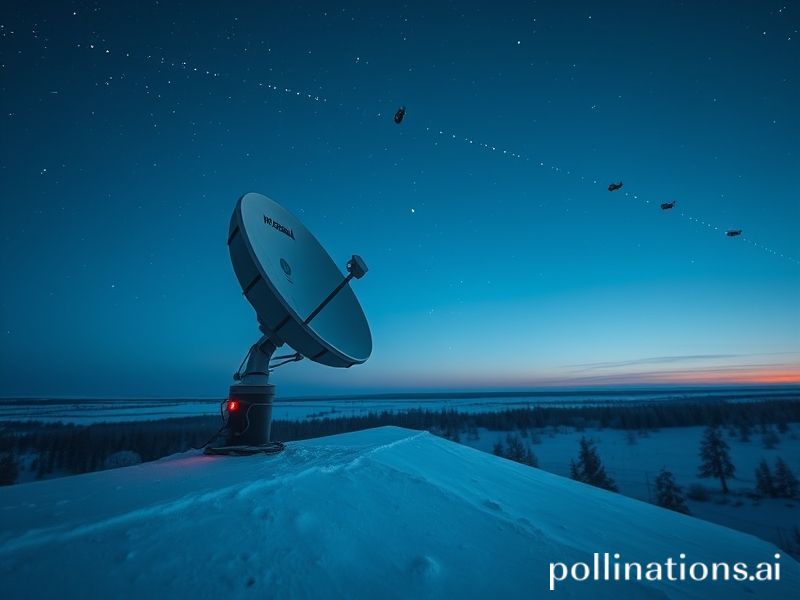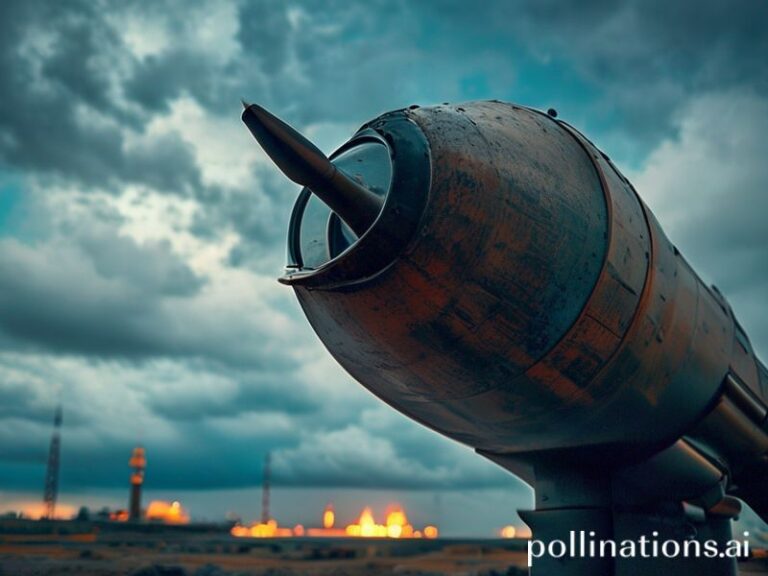When the Sky Blinks: How a 37-Minute Starlink Outage Gave Earth a Mild Existential Crisis
Starlink Goes Dark: A Global Panic in 280 Characters or Less
By Diego “Still Buffering” Morales, Senior Orbital Correspondent
Wednesday, 06:14 UTC—Somewhere above the Indian Ocean, 4,198 toaster-sized satellites decided to take an unscheduled coffee break. Down on Earth, the fallout was immediate and, frankly, theatrical. In the Siberian science city of Akademgorodok, a PhD candidate screamed into the permafrost when his thesis on Arctic methane couldn’t auto-upload. In Lagos, a fintech startup’s morning stand-up dissolved into interpretive dance because nobody could share their screen. And on a super-yacht drifting off Montenegro, a crypto baron threatened to fire the entire crew for failing to “reboot the sky.”
The outage—Starlink’s first planet-wide siesta since it emerged from Elon’s garage of dreams—lasted a mere 37 minutes. Yet in that sliver of time the fragility of our new, low-Earth-orbit lifestyle was exposed like a bad facelift under fluorescent light. Suddenly, the same governments that once sniffed at “private space internet” were speed-dialing SpaceX for status reports. New Zealand’s emergency management agency issued an official “Don’t Panic, But Maybe Panic a Little” bulletin. The French foreign ministry, never one to miss a rhetorical flourish, called the blackout “a moment of planetary introspection”—translation: “We told you relying on one guy’s toy satellites was idiotic.”
Global South observers offered the most exquisite irony. For years, Washington hectored nations about the dangers of Huawei’s 5G, only to watch half of rural Kenya discover their entire credit-union backbone was, in fact, strapped to a grid of flying routers named after raccoons from Guardians of the Galaxy. Kenyan telecom regulator Amina Otieno summed it up with bureaucratic poetry: “When the sky blinks, the village ATM blinks back at you, dumbly.”
Of course, the outage was felt most acutely where the sky is usually an afterthought. In the Solomon Islands, a nurse attempting a tele-surgery consult saw the feed freeze mid-incision, leaving her staring at a still frame of gallbladder like a macabre oil painting. Meanwhile, a Ukrainian drone operator near Kherson reported losing Starlink mid-reconnaissance and, without missing a beat, launched the drone on “vintage autopilot,” proving that trench ingenuity outranks venture capital every time.
Financial markets—those finely tuned anxiety engines—flinched. Starlink’s sister company Tesla dipped 3.8 %, then recovered when traders realized people still need cars to drive to places where the internet now works again. SpaceX’s private valuation, however, remained aloft at $180 billion, a figure roughly equal to the GDP of Hungary, reminding us that delusion is the most renewable resource on Earth.
Diplomatically, the outage became a Rorschach test. Beijing’s state media proclaimed it evidence that “capitalist constellations” are unreliable, neatly omitting that China’s own Guowang constellation is still mostly CGI. The European Space Agency offered to “multilateralize” satellite internet, which in EU parlance means 47 working groups, three white papers, and a commemorative stamp by 2037.
Back on terra firma, the human comedy resumed. In suburban Melbourne, a teenager live-tweeted the drama using his mom’s 3G phone, ending every post with “#DarkAges.” A Canadian influencer staged a “Starlink vigil” on TikTok, lighting artisanal beeswax candles in the shape of dish antennas—sold out in 12 minutes, naturally. And in Silicon Valley, a VC firm reportedly convened an emergency “space resiliency” summit at a Michelin-starred restaurant, where attendees spent $3,000 per head to agree that redundancy is, like, super important.
The official post-mortem blamed a “routine software update” gone rogue—tech-speak for “oops.” SpaceX promises a fix “soon-ish.” Humanity, meanwhile, has already updated its coping strategy: stockpile coffee, hoard USB sticks, and remember that clouds—those fluffy analog ancestors—never needed a patch.
In the end, the outage was less about broken satellites than about our insistence on entrusting civilization’s circulatory system to a mesh of whizzing space kettles operated by a company whose customer service bot once told a farmer in Patagonia to “try turning the atmosphere off and on again.” Thirty-seven minutes of darkness reminded 7.9 billion people that, while progress may be written in the stars, the footnotes are still written by fallible humans with questionable GitHub hygiene. And that, dear reader, is what passes for stability in the 21st century.







